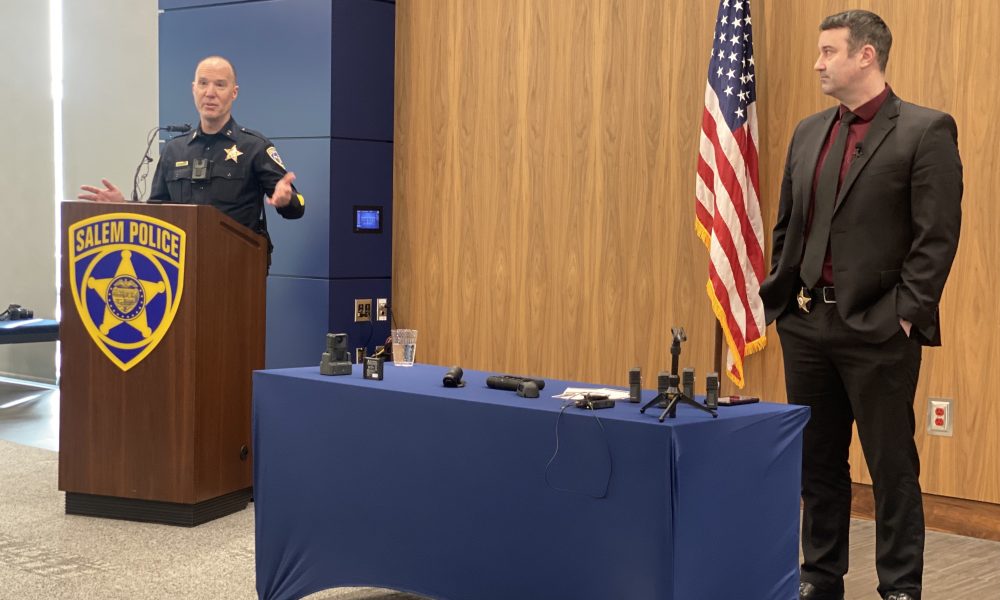Salem police officers will have uniform-mounted cameras next week, capturing video and audio of officers’ encounters with citizens to be kept as a public record, the Salem Police Department announced on Wednesday.
The department expects to supply officers with the so-called body cams by Monday, Feb. 13. The cameras must be worn by officers on patrol as well as detectives responding to calls or “involved in enforcement activities,” according to department policy.
Salem police will use cameras under a five-year contract with Chicago-based Motorola Solutions. The contract works out to about $400,000 a year, Police Chief Trevor Womack said at a press conference Wednesday.
The announcement comes over a year after the Salem City Council voted in November 2021 to accept a $816,000 state grant to fund a body-worn camera program for police. The state grant will cover the first two years of the department’s equipment costs.
The agency is implementing the cameras as the U.S. is seeing increasing public scrutiny of police conduct, with the use of video providing unprecedented visibility to incidents involving use of force by officers.
Salem’s program has been nearly two years in the works, according to Womack. He said the cameras will help improve the quality of police investigations, better document scenes and statements made to officers, build trusting relationships with the community, and hold both his agency and members of the community accountable.
After previous efforts to start such a program stalled due to hefty costs, the Salem Budget Committee recommended that a body-worn camera and dash camera program be included in the budget. The city council voted in June 2021 to allocate the funding.
Since then, the department has developed policies focused on the cameras, tested cameras from different vendors and trained officers in using the Motorola devices.
Brandon Ditto, acting deputy chief of Salem police’s support division, said the department was able to learn which vendors offered reliable cameras by looking at other law enforcement agencies in the state that use them.
“Although we would’ve rather had this technology early on, we have the benefit that we’re not the first one in this space,” Ditto said at the press conference.
Womack said Wednesday that the process of selecting a vendor and supply chain issues delayed the department’s plan to supply officers with body-worn cameras by summer 2022.
The chief said well over half of the 18,000 law enforcement agencies across the country have a body-worn camera system in place.
“I do think we’re a bit behind the times,” he said. “In my mind, it’s becoming a standard piece of law enforcement equipment.”
Nearly all Salem police officers have been trained to use the body-worn camera system, and up to 20 cameras have already been used on duty, according to Ditto.
He said the department has cameras for 193 officers and will have to purchase six more for additional officers who were hired more recently.
Womack said it will take longer to install cameras in patrol cars – also covered in the budget – which could happen during the summer.
Video captured on the cameras would be subject to the Oregon Public Records Law.
“This is going to be held exactly like any other piece of evidence or record,” Womack said.
When asked how quickly videos would be released when requested, he said the department had hired additional staff to help manage the workload it anticipates.
“We’re committed to try and be as quick and as prepared with our process as possible and stick to the standards that we already have,” he said.
Authorities in Memphis, Tennessee, released body camera video 20 days after officers were recording assaulting a man who later died of his injuries. The Oregon State Police released video of trooper interactions with a state legislator two days after the traffic stops.
Womack said videos used as evidence in an ongoing prosecution won’t be released.
When video is disclosed, Ditto said certain images including faces, license plates and computer scenes with confidential information would be blurred.
Womack said he expects video recorded on his agency’s body-worn cameras to be included when the Marion County District Attorney’s Office releases findings of grand jury determinations in shootings involving police.
“(In) any criminal case, but especially for an officer-involved shooting and deadly use of force investigation, they’re going to be critical pieces of evidence,” he said.
Officers are required to activate the camera at the start of any interaction with a person “in which the officer develops reasonable suspicion or probable cause to believe a crime or violation has occurred, is occurring or will occur,” according to the Salem police website. “Recording stops when the officer concludes their participation in the contact. In general, casual conversations with community members will not be recorded.”
Police will notify anyone involved that a recording is underway at the start of the interaction “or as soon as it is safe and practicable,” the department’s website says.
Officers can stop recording an interaction at the request of a person if the officer determines that privacy outweighs any police interest in recording, such as an arrest or search. The officer must first record the request by the person to disable the camera along with the officer’s response, and should resume recording the interaction “when privacy is no longer a concern,” according to the website.
Under state law, officers cannot edit or delete recordings captured by such cameras. Law enforcement agencies are required to edit the video to redact the faces of any person that is captured. The department keeps an original video intact.
For any recording not related to a court proceeding or pending investigation, the department will preserve recordings from body-worn or dash cameras for at least 190 days, and no more than 30 months.
In cases that do not have suspect information, are rejected by the district attorney’s office, or don’t result in any charges being filed, the Salem police will retain video based on the seriousness of the instance. They will be kept permanently for homicides, three to six years for felonies, two years for misdemeanors, 190 days for non-criminal offenses and 30 months for violations.
PREVIOUS COVERAGE:
Salem police will have body cameras by summer, publish more crime data and policies
City council votes to accept body-worn camera funding for Salem police
Body cameras for police included in upcoming city budget
Salem police union calls for body cameras, but hefty price tag has stalled efforts in the past
Contact reporter Ardeshir Tabrizian: [email protected] or 503-929-3053.
SUBSCRIBE TO GET SALEM NEWS – We report on your community with care and depth, fairness and accuracy. Get local news that matters to you. Subscribe today to get our daily newsletters and more. Click I want to subscribe!

Ardeshir Tabrizian has covered criminal justice and housing for Salem Reporter since September 2021. As an Oregon native, his award-winning watchdog journalism has traversed the state. He has done reporting for The Oregonian, Eugene Weekly and Malheur Enterprise.









